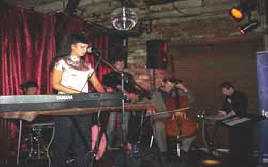
|
 |
|

Guitar Center Now Ships
Internationally
to over 90 countries! |
|
 |
|
 |
|
 |
|
|

|
|
|
6/29/2011 6:15:08 PM
|
|
Starting A Band Part 2
|
| |
INTRODUCTION
So you've managed to get the right musicians together to form your band, you've decided on a style, and now it's time to decide what songs you're going to play (your "repertoire"), and how you're going to play them (your "arrangements"). Agreeing on repertoire and arrangements is never easy, and the more members you have in your band, the harder it is to build a consensus because there are that many more opinions that need to be considered. In this installment, I'll cover some ideas you should keep in mind to maximize the amount of happiness within your newly-formed group when you're making these decisions and building your song list.
WHAT TYPE OF SONGS WILL YOU PLAY?
 There are two main sources from which you can draw your repertoire. You can play known songs by known bands (called "covers") and you can play songs that you write yourself (called "originals"). Most bands start off playing cover tunes because it's the music they know and love. Simply put, playing cover tunes is your chance to emulate your idols, and it's a pretty powerful experience. As the band and its members mature musically, the natural tendency is to add original tunes written by one or more members of the band until the originals begin to dominate the list of tunes you play live (i.e. your "setlist").
There are two main sources from which you can draw your repertoire. You can play known songs by known bands (called "covers") and you can play songs that you write yourself (called "originals"). Most bands start off playing cover tunes because it's the music they know and love. Simply put, playing cover tunes is your chance to emulate your idols, and it's a pretty powerful experience. As the band and its members mature musically, the natural tendency is to add original tunes written by one or more members of the band until the originals begin to dominate the list of tunes you play live (i.e. your "setlist").
PREPARING FOR THE FIRST REHERSAL
The two things to keep in mind for any rehearsal are:
1. The band should know what songs they're going to play
2. The band should all know their individual parts
"There is no better way to alienate someone than to casually dismiss their request to play a tune that showcases their talents..."
For the first rehearsal, the easiest thing to do is to start off with some cover tunes that everyone knows. Ideally, these should be tunes that you will eventually want as part of your repertoire, but they don't necessarily have to be. The main thing is to make those first few steps toward establishing some kind of musical common ground among the band. If you're somewhat organized, you can create tapes of the tunes and distribute them to the band a few days before the rehearsal so that anyone unfamiliar with the tunes has a chance to learn them. Remember that the first time you get together to play, you are also getting to know each other musically. You want to try to eliminate as many potential problems off the bat. Covers are great because you know how they're supposed to sound, and thus, makes it easier for you to judge how well the band sounds. Making sure that everyone knows the tunes before the first rehearsal insures that the band won't be sitting around while someone is being taught their part.
CREATING ARRANGEMENTS
If you do decide to play some covers for your first rehearsal, then for now, you don't have to worry about the arrangement, which is the collection of the actual musical parts that the band plays. The simplest thing is to just have each member learn the exact part on the record, and then come together to play it, and hear how it sounds. Again, I reiterate that, at this stage, there are a lot of advantages to just playing tunes straight from the record:
1. You don't have to write the tune
2. You know how they're supposed to sound
You don't have to create a special arrangement for them.
As your band progresses creatively and musically, then you might want to change the arrangements for any cover tunes that you play, in order to reflect the uniqueness of your band. This is why "Subterranean Homesick Blues" performed by the Red Hot Chili Peppers doesn't sound like Bob Dylan's original version.
If you do decide to play originals off the bat, it still helps to have some kind of demo tape to give the band a rough idea of what it should sound like. However, there may be instances where the person who wrote it isn't quite sure how it's supposed to sound, and it's often left up to the band to jam on it for a while, and to amend the arrangement as ideas surface.
THE CONCEPT OF MUSICAL DIRECTOR
 A musical director is a term commonly associated with marching bands, choirs, and more formal musical organizations. They create arrangements of songs that the group will play, and have a primary voice is choosing material. Ideally, they are experienced musicians, and their extra preparation of the material before rehearsals makes the rehearsal process runs much smoother. They know the arrangments inside and out and can help correct the group when mistakes are made in rehearsal. How does this apply to your band? Well, there are two main tasks that need to be performed, either by a single person, or by committee: Arrangements need to be created or agreed upon.
A musical director is a term commonly associated with marching bands, choirs, and more formal musical organizations. They create arrangements of songs that the group will play, and have a primary voice is choosing material. Ideally, they are experienced musicians, and their extra preparation of the material before rehearsals makes the rehearsal process runs much smoother. They know the arrangments inside and out and can help correct the group when mistakes are made in rehearsal. How does this apply to your band? Well, there are two main tasks that need to be performed, either by a single person, or by committee: Arrangements need to be created or agreed upon.
The arrangements need to be evaluated, and amended if they don't sound good.
In the case where everyone figures out their own parts, and then comes together to play them, the concept of a single musical director is less prevalent. In a sense, the arrangement has been created by the band itself, and not a single person. However, if there is one person in your band who is going to figure out all the tunes, help other band members learn them, and direct the process of how you rehearse them, then this person is filling the role of musical director. For young bands in which the players are less knowledgeable about their instruments, this is often the most advanced player in the group, because they may be the only one with enough skills to figure out the arrangement, and to teach it to the other band members if necessary.
In addition, certain members may temporarily play the role of musical director, often when they are so eager to play a specific song that they ware willing to do the extra work to get the band to play it. I played in one band where the keyboardist was so bent on playing a particular Squeeze tune that he wrote out chord charts for it, and taught our inexperienced bass player his part before rehearsal. When it came time for the band to play it for the first time, it was smooth as silk. In this case, the keyboardist had assumed the role of the musical director. I've also played in some bands where everyone figured out their own parts and knew the form of the songs, enabling us to play new songs in a matter of minutes. In this case, there was no real musical director.
PLAYING TO THE BANDS STRENGTHS
It's a good idea to tailor your repertoire and arrangements to areas at which your band members excel, or for which your band is properly equipped. If you have no background vocalists and no acoustic guitar, then it's probably a good idea not to play Crosby, Stills, and Nash covers. If your lead guitarist player is not particularly strong, then you might want to stay away from Van Halen. On the other hand, if your lead guitarist has spent a lot of time learning a Kirk Hammett solo, then you might want to include that tune in your repertoire. There is no better way to alienate someone in a band than to casually dismiss a request by that member to play a tune that lets them display their talents, especially if this is something on which they've worked hard.
The one band member most easily affected by repertoire and arrangements is your vocalist. The voice is more fragile than a guitar, bass, or drums, and special consideration should be given to your vocalist before deciding on songs. Choose songs that fit your vocalist's range. Talk to them and figure out what range is comfortable. If you must do a song that doesn't fit your vocalist's range, then change the key of the song until it does. A good singer is hard enough to find, so don't aggravate them by choosing songs and keys that continually trash their voice.
FINALLY...
That's it for this installment in this series. I hope that this has given you something to think about and will help you in your quest to form a successful band. Now start writing out some set lists and determine who's going to figure out the tunes...
|
| |
|
Back
To Articles Main Page
| Comments For
This Article |
|
|
|
|
|
4/14/2018 4:17:42 AM
PST |
|
(
) |
|
|
|
|
|
4/14/2018 4:23:45 AM
PST |
|
(
) |
|
|
|
|
|
4/17/2019 1:55:49 PM
PST |
|
(
) |
|
|
|
|
|
4/17/2019 1:56:39 PM
PST |
|
(
) |
|
|
|
|
|
4/13/2020 2:11:00 PM
PST |
|
(
) |
|
|
|
|
|
3/12/2022 6:31:58 AM
PST |
|
(
) |
|
|
|
|
|
3/12/2022 6:35:33 AM
PST |
|
(
) |
|
|
|
|
|
|
 |
|
|
Slap And Pop! DVD
|

|
|
By
Gary Denyer
|
| |
|
This comprehensive GAZZBASS.COM DVD SET, "SlaP And PoP" chronicles the bass guitar, its history, and the techniques of slap bass playing. A must for the beginner or intermediate, and a great reference work for the advanced, "SlaP And PoP" is both a musical journey and a teaching tool for all the budding slappers out there...
|
|
Learn
More...
|
|
|
|
21 Techniques For Monster Chops
|

|
|
By
Gary Denyer
|
| |
|
"21 Techniques For Monster Chops!" is a vastly revised and immeasurably more informative version of our online slap bass mini course! Due to an enormous amount of requests and questions, we've produced this all-inclusive DVD! With 7 extra techniques and a book full of tab, notation and explanations...
|
|
Learn
More...
|
|
|
|
| |
|